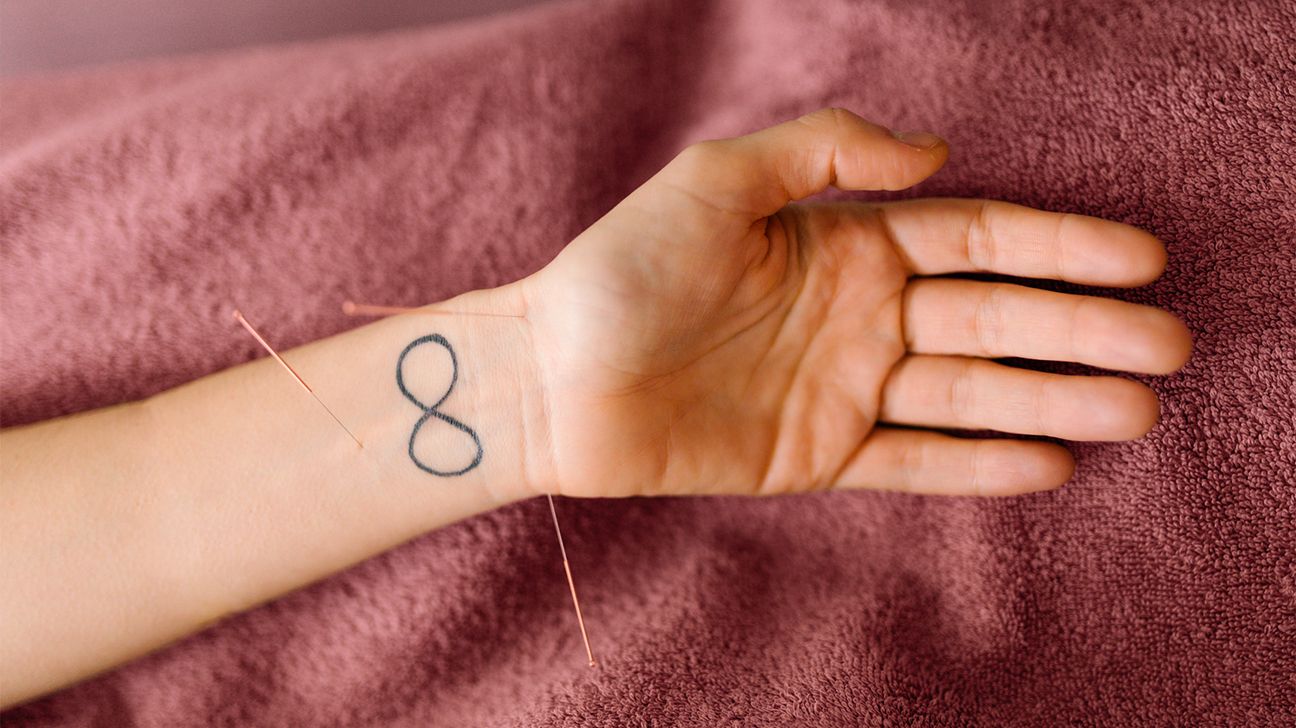Acupuncture is an alternative medicine practice that involves stimulating trigger points under the surface of your skin with super-thin needles. It might sound hokey or even sketchy, but it’s a longstanding effective treatment for certain health issues.
Generally, acupuncture is considered safe for most people as long as a well-trained, licensed, and board certified practitioner is administering it. But, like any other treatment, acupuncture isn’t without risks.
Here’s what to know if you’re mildly curious about this needle treatment and the facts on acupuncture safety.

Actually, yes. Research has shown that poking specific trigger points with ultrathin needles really can help relieve pain.
Whether acupuncture works for you will depend on what you want out of it.
Folks who stan this alternative treatment have claimed that it helps with everything from psoriasis and eczema to weight loss. But scientific evidence is slim for its effectiveness against anything other than chronic pain.
While many studies are small or dated, research suggests that acupuncture might also help with:
- PMS
- anxiety
- insomnia
- tension headaches
- arthritis
- weight loss
- eczema
- fertility and in vitro fertilization (IVF) support
Bottom line: Research suggests that acupuncture works for pain management. We need more studies to understand its full potential.
Acupuncture is considered generally safe for most folks (more on that later).
Of course, you don’t want just anyone jabbing you. Check the National Certification Commission for Acupuncture and Oriental Medicine to find a local licensed, board certified practitioner.
Risks of amateur acupuncture treatment include:
- injury
- organ perforation (😱)
- infections from grody needles
It’s super, super rare, but deep shoulder or upper back acupuncture comes with a risk of lung collapse. Get help ASAP if you experience any of these symptoms during or after a session:
- shortness of breath
- sudden chest pressure
- stabbing chest pain
- extreme shoulder or upper back pain
- coughing up blood
Again, side effects are rare, but it’s important to be aware of the risks.
Some folks should just steer clear of acupuncture. In some cases it’s because of known complications, while in other cases there isn’t enough research to know how acupuncture might affect an underlying health condition.
These folks should consult a healthcare pro before even considering acupuncture:
- those with an active infection
- anyone with an AICD implant or pacemaker
- people with bleeding disorders
Acupuncture during pregnancy is also considered safe if performed by a licensed and board certified practitioner. But chatting with your primary healthcare professional can help you decide whether acupuncture is right for you.
We get it — someone sliding needles into your skin sounds downright torturous. But even though acupuncture includes, ya know, puncture, it shouldn’t hurt. These needles are far thinner than the ones used for a standard blood draw.
Of course, a lack of searing pain doesn’t mean it’s bliss. Sensations could include:
- tingling
- pressure
- dull aching
- throbbing
- heaviness
The degree of pain you may experience depends on:
- your pain tolerance
- the pressure point being stimulated (some body parts are more sensitive than others)
- needle thickness
- needle depth
Remember, research suggests that acupuncture can help relieve pain, not cause it. If you experience sudden or intense pain during a session, tell your practitioner ASAP.
Acupuncture has been part of traditional Chinese medicine (TCM) for centuries. TCM practitioners believe that there are more than 2,000 trigger points in the body that channel the energy flow (Qi) vital to good health.
TCM offers a different perspective than conventional Western medicine, obviously. But that doesn’t mean you can’t see a highly trained, certified professional when you try acupuncture.
During your session, you’ll lie on a bed or table similar to a massage table. Your acupuncturist will discuss your symptoms and treatment goals before inserting several sterile, hair-thin needles into various points on your body. Expect the needles to reach 1 to 2 inches deep.
Once the needles are in, your practitioner might stimulate them with heat or electricity. You’ll need to stay still for up to 30 minutes with the needles intact. Practitioners say this is when your nervous system lights up and your Qi flows and regulates itself.
While you wait, blood flow increases around the needles — this reduces inflammation and swelling. Your brain also releases more serotonin, dopamine, and endorphins, which can lead to relaxation, stress relief, and pain reduction.
Once your time is up, your acupuncturist will gently pull out the needles and discard them.
Keep in mind that acupuncture isn’t a one-and-done deal. Most folks attend several weekly or twice-weekly sessions before they experience any changes.
Some tips to prep for your first acupuncture session
- Look for a licensed, board certified acupuncturist.
- Wear comfy clothes.
- Be prepared to lie down for 20+ minutes.
- Don’t forget to breathe!
- Acupuncture has been used in alternative medicine for hundreds of years.
- Research shows that acupuncture is effective against chronic pain — but folks use it for everything from skin issues to weight loss.
- Acupuncture is considered generally safe when performed by a licensed, board certified professional.
- Despite its relative safety, acupuncture is not recommended for some people, including those with chronic infections and bleeding disorders.
- Talk with your doctor if you’re interested in trying acupuncture to help you manage chronic pain or other conditions.

